Skip to content

Georgia Institute of Technology College of Sciences
Search form.
- You are here:
- Graduate Programs
- Doctoral Programs
PhD in Mathematics
Here are the requirements for earning the PhD degree in Mathematics offered by the School of Math. For requirements of other PhD programs housed within the School, please see their specific pages at Doctoral Programs . The requirements for all these programs consist of three components: coursework , examinations , and dissertation in accordance to the guidelines described in the GT Catalogue .
Completion of required coursework, examinations, and dissertation normally takes about five years. During the first one or two years, students concentrate on coursework to acquire the background necessary for the comprehensive examinations. By the end of their third year in the program, all students are expected to have chosen a thesis topic, and begin work on the research and writing of the dissertation.
The program of study must contain at least 30 hours of graduate-level coursework (6000-level or above) in mathematics and an additional 9 hours of coursework towards a minor. The minor requirement consists of graduate or advanced undergraduate coursework taken entirely outside the School of Mathematics, or in an area of mathematics sufficiently far from the students area of specialization.
Prior to admission to candidacy for the doctoral degree, each student must satisfy the School's comprehensive examinations (comps) requirement. The first phase is a written examination which students must complete by the end of their second year in the graduate program. The second phase is an oral examination in the student's proposed area of specialization, which must be completed by the end of the third year.
Research and the writing of the dissertation represent the final phase of the student's doctoral study, and must be completed within seven years of the passing of comps. A final oral examination on the dissertation (theses defense) must be passed prior to the granting of the degree.
The Coursework
The program of study must satisfy the following hours , minor , and breadth requirements. Students who entered before Fall 2015 should see the old requirements , though they may opt into the current rules described below, and are advised to do so.
Hours requirements. The students must complete 39 hours of coursework as follows:
- At least 30 hours must be in mathematics courses at the 6000-level or higher.
- At least 9 hours must form the doctoral minor field of study.
- The overall GPA for these courses must be at least 3.0.
- These courses must be taken for a letter grade and passed with a grade of at least C.
Minor requirement. The minor field of study should consist primarily of 6000-level (or higher) coursework in a specific area outside the School of Math, or in a mathematical subject sufficiently far from the student’s thesis work. A total of 9 credit hours is required and must be passed with a grade of B or better. These courses should not include MATH 8900, and must be chosen in consultation with the PhD advisor and the Director of Graduate Studies to ensure that they form a cohesive group which best complements the students research and career goals. A student wishing to satisfy the minor requirement by mathematics courses must petition the Graduate Committee for approval. Courses used to fulfill a Basic Understanding breadth requirement in Analysis or Algebra should not be counted towards the doctoral minor. Upon completing the minor requirement, a student should immediately complete the Doctoral Minor form .
Breadth requirements. The students must demonstrate:
- Basic understanding of 2 subjects must be demonstrated through passing the subjects' written comprehensive exams. At least 1 of these 2 exams must be in Algebra or Analysis.
- Basic understanding of the third subject may be demonstrated either by completing two courses in the subject (with a grade of A or B in each course) or by passing the subject's written comprehensive exam.
- A basic understanding of both subjects in Area I (analysis and algebra) must be demonstrated.
- Earning a grade of A or B in a one-semester graduate course in a subject demonstrates exposure to the subject.
- Passing a subject's written comprehensive exam also demonstrates exposure to that subject.
The subjects. The specific subjects, and associated courses, which can be used to satisfy the breadth requirements are as follows.
- Area I subjects:
- Area II subjects:
Special Topics and Reading Courses.
- Special topics courses may always be used to meet hours requirements.
- Special topics courses may be used to meet breadth requirements, subject to the discretion of the Director of Graduate Studies.
- Reading courses may be used to meet hours requirements but not breadth requirements.
Credit Transfers
Graduate courses completed at other universities may be counted towards breadth and hours requirements (courses designated as undergraduate or Bachelors' level courses are not eligible to transfer for graduate credit). These courses do not need to be officially transferred to Georgia Tech. At a student’s request, the Director of Graduate Studies will determine which breadth and hours requirements have been satisfied by graduate-level coursework at another institution.
Courses taken at other institutions may also be counted toward the minor requirement, subject to the approval of the Graduate Director; however, these courses must be officially transferred to Georgia Tech.
There is no limit for the transfer of credits applied toward the breadth requirements; however, a maximum of 12 hours of coursework from other institutions may be used to satisfy hours requirements. Thus at least 27 hours of coursework must be completed at Georgia Tech, including at least 18 hours of 6000-level (or higher) mathematics coursework.
Students wishing to petition for transfer of credit from previous graduate level work should send the transcripts and syllabi of these courses, together with a list of the corresponding courses in the School of Math, to the Director of Advising and Assessment for the graduate program.
Comprehensive Examinations
The comprehensive examination is in two phases. The first phase consists of passing two out of seven written examinations. The second phase is an oral specialty examination in the student's planned area of concentration. Generally, a student is expected to have studied the intended area of research but not necessarily begun dissertation research at the time of the oral examination.
Written examinations. The written examinations will be administered twice each year, shortly after the beginning of the Fall and Spring semesters. The result of the written examination is either pass or fail. For syllabi and sample exams see the written exams page .
All students must adhere to the following rules and timetables, which may be extended by the Director of Graduate Studies, but only at the time of matriculation and only when certified in writing. Modifications because of leaves from the program will be decided on a case-by-case basis.
After acceptance into the PhD Program in Mathematics, a student must pass the written examinations no later than their fourth administration since the student's doctoral enrollment. The students can pass each of the two written comprehensive exams in separate semesters, and are allowed multiple attempts.
The Director of Graduate Studies (DGS) will be responsible for advising each new student at matriculation of these rules and procedures and the appropriate timetable for the written portion of the examination. The DGS will also be responsible for maintaining a study guide and list of recommended texts, as well as a file of previous examinations, to be used by students preparing for this written examination.
Oral examination. A student must pass the oral specialty examination within three years since first enrolling in the PhD program, and after having passed the written portion of the comprehensive exams. The examination will be given by a committee consisting of the student's dissertation advisor or probable advisor, two faculty members chosen by the advisor in consultation with the student, and a fourth member appointed by the School's Graduate Director. The scope of the examination will be determined by the advisor and will be approved by the graduate coordinator. The examining committee shall either (1) pass the student or (2) fail the student. Within the time constraints of which above, the oral specialty examination may be attempted multiple times, though not more than twice in any given semester. For more details and specific rules and policies see the oral exam page .
Dissertation and Defense
A dissertation and a final oral examination are required. For details see our Dissertation and Graduation page, which applies to all PhD programs in the School of Math.
Best Mathematics Programs
Ranked in 2023, part of Best Science Schools
A graduate degree in mathematics can help students hone
A graduate degree in mathematics can help students hone their skills in a specialty area, from algebra and number theory to discrete mathematics and combinatorics. These are the best graduate-level math programs. Each school's score reflects its average rating on a scale from 1 (marginal) to 5 (outstanding), based on a survey of academics at peer institutions. Read the methodology »
- Clear Filters
PhD Program
More information and a full list of requirements for the PhD program in Mathematics can be found in the University Bulletin .
During their first year in the program, students typically engage in coursework and seminars which prepare them for the Qualifying Examinations . Currently, these two exams test the student’s breadth of knowledge in algebra and real analysis.
Starting in Autumn 2023, students will choose 2 out of 4 qualifying exam topics:
- real analysis
- geometry and topology
- applied mathematics
Course Requirements for students starting prior to Autumn 2023
To qualify for candidacy, the student must have successfully completed 27 units of Math graduate courses numbered between 200 and 297.
Within the 27 units, students must satisfactorily complete a course sequence. This can be fulfilled in one of the following ways:
- Math 215A, B, & C: Algebraic Topology, Differential Topology, and Differential Geometry
- Math 216A, B, & C: Introduction to Algebraic Geometry
- Math 230A, B, & C: Theory of Probability
- 3 quarter course sequence in a single subject approved in advance by the Director of Graduate Studies.
Course Requirements for students starting in Autumn 2023 and later
To qualify for candidacy, the student must have successfully completed 27 units of Math graduate courses numbered between 200 and 297. The course sequence requirement is discontinued for students starting in Autumn 2023 and later.
By the end of Spring Quarter of their second year in the program, students must have a dissertation advisor and apply for Candidacy.
During their third year, students will take their Area Examination , which must be completed by the end of Winter Quarter. This exam assesses the student’s breadth of knowledge in their particular area of research. The Area Examination is also used as an opportunity for the student to present their committee with a summary of research conducted to date as well as a detailed plan for the remaining research.
Years 4&5
Typically during the latter part of the fourth or early part of the fifth year of study, students are expected to finish their dissertation research. At this time, students defend their dissertation as they sit for their University Oral Examination. Following the dissertation defense, students take a short time to make final revisions to their actual papers and submit the dissertation to their reading committee for final approval.
Throughout the PhD Program
All students continue through each year of the program serving some form of Assistantship: Course, Teaching or Research, unless they have funding from outside the department.
Our graduate students are very active as both leaders and participants in seminars and colloquia in their chosen areas of interest.

Ph.D. Program Overview
Description.
The graduate program in the field of mathematics at Cornell leads to the Ph.D. degree, which takes most students five to six years of graduate study to complete. One feature that makes the program at Cornell particularly attractive is the broad range of interests of the faculty . The department has outstanding groups in the areas of algebra, algebraic geometry, analysis, applied mathematics, combinatorics, dynamical systems, geometry, logic, Lie groups, number theory, probability, and topology. The field also maintains close ties with distinguished graduate programs in the fields of applied mathematics , computer science , operations research , and statistics .
Core Courses
A normal course load for a beginning graduate student is three courses per term.
There are no qualifying exams, but the program requires that all students pass four courses to be selected from the six core courses. First-year students are allowed to place out of some (possibly, all) of the core courses. In order to place out of a course, students should contact the faculty member who is teaching the course during the current academic year, and that faculty member will make a decision. The minimum passing grade for the core courses is B-; no grade is assigned for placing out of a core course.
At least two core courses should be taken (or placed out) by the end of the first year. At least four core courses should be taken (or placed out) by the end of the second year (cumulative). These time requirements can be waived for students with health problems or other significant non-academic problems. They can be also waived for students who take time-consuming courses in another area (for example, CS) and who have strong support from a faculty; requests from such students should be made before the beginning of the spring semester.
The core courses are distributed among three main areas: analysis, algebra and topology/geometry. A student must pass at least one course from each group. All entering graduate students are encouraged to eventually take all six core courses with the option of an S/U grade for two of them.
The six core courses are:
MATH 6110, Real Analysis
MATH 6120, Complex Analysis
MATH 6310, Algebra 1
MATH 6320, Algebra 2
MATH 6510, Introductory Algebraic Topology
MATH 6520, Differentiable Manifolds.
Students who are not ready to take some of the core courses may take MATH 4130-4140, Introduction to Analysis, and/or MATH 4330-4340, Introduction to Algebra, which are the honors versions of our core undergraduate courses.
"What is...?" Seminar
The "What Is...?" Seminar is a series of talks given by faculty in the graduate field of Mathematics. Speakers are selected by an organizing committee of graduate students. The goal of the seminar is to aid students in finding advisors.
Schedule for the "What Is...?" seminar
Special Committee
The Cornell Graduate School requires that every student selects a special committee (in particular, a thesis adviser, who is the chair or the committee) by the end of the third semester.
The emphasis in the Graduate School at Cornell is on individualized instruction and training for independent investigation. There are very few formal requirements and each student develops a program in conjunction with his or her special committee, which consists of three faculty members, some of which may be chosen from outside the field of mathematics.
Entering students are not assigned special committees. Such students may contact any of the members on the Advising Committee if they have questions or need advice.
Current Advising Committee
Analysis / Probability / Dynamical Systems / Logic: Lionel Levine Geometry / Topology / Combinatorics: Kathryn Mann Probability / Statistics: Philippe Sosoe Applied Mathematics Liaison: Richard Rand
Admission to Candidacy
To be admitted formally to candidacy for the Ph.D. degree, the student must pass the oral admission to candidacy examination or A exam. This must be completed before the beginning of the student's fourth year. Upon passing the A exam, the student will be awarded (at his/her request) an M.S. degree without thesis.
The admission to candidacy examination is given to determine if the student is “ready to begin work on a thesis.” The content and methods of examination are agreed on by the student and his/her special committee before the examination. The student must be prepared to answer questions on the proposed area of research, and to pass the exam, he/she must demonstrate expertise beyond just mastery of basic mathematics covered in the core graduate courses.
To receive an advanced degree a student must fulfill the residence requirements of the Graduate School. One unit of residence is granted for successful completion of one semester of full-time study, as judged by the chair of the special committee. The Ph.D. program requires a minimum of six residence units. This is not a difficult requirement to satisfy since the program generally takes five to six years to complete. A student who has done graduate work at another institution may petition to transfer residence credit but may not receive more than two such credits.
The candidate must write a thesis that represents creative work and contains original results in that area. The research is carried on independently by the candidate under the supervision of the chairperson of the special committee. By the time of the oral admission to candidacy examination, the candidate should have selected as chairperson of the committee the faculty member who will supervise the research. When the thesis is completed, the student presents his/her results at the thesis defense or B Exam. All doctoral students take a Final Examination (the B Exam, which is the oral defense of the dissertation) upon completion of all requirements for the degree, no earlier than one month before completion of the minimum registration requirement.
Masters Degree in the Minor Field
Ph.D. students in the field of mathematics may earn a Special Master's of Science in Computer Science. Interested students must apply to the Graduate School using a form available for this purpose. To be eligible for this degree, the student must have a member representing the minor field on the special committee and pass the A-exam in the major field. The rules and the specific requirements for each master's program are explained on the referenced page.
Cornell will award at most one master's degree to any student. In particular, a student awarded a master's degree in a minor field will not be eligible for a master's degree in the major field.
Graduate Student Funding
Funding commitments made at the time of admission to the Ph.D. program are typically for a period of five years. Support in the sixth year is available by application, as needed. Support in the seventh year is only available by request from an advisor, and dependent on the availability of teaching lines. Following a policy from the Cornell Graduate School, students who require more than seven years to complete their degree shall not be funded as teaching assistants after the 14th semester.
Special Requests
Students who have special requests should first discuss them with their Ph.D. advisor (or with a field member with whom they work, if they don't have an advisor yet). If the advisor (or field faculty) supports the request, then it should be sent to the Director of Graduate Studies.
Department of Mathematics
Mathematics phd program.
The Ph.D. program in the Department of Mathematics provides students with in-depth knowledge and rigorous training in all the subject areas of mathematics. A core feature is the first-year program, which helps bring students to the forefront of modern mathematics. Students work closely with faculty and each other and participate fully in both research and student-run seminars.
Questions? Email [email protected]
- The firm deadline for applications for Autumn 2025, is December 5, 2024.
- The (general and advanced) GRE tests are no longer accepted. Please do not submit these scores.
Graduate Program
Our graduate program is unique from the other top mathematics institutions in the U.S. in that it emphasizes, from the start, independent research. Each year, we have extremely motivated and talented students among our new Ph.D. candidates who, we are proud to say, will become the next generation of leading researchers in their fields. While we urge independent work and research, there exists a real sense of camaraderie among our graduate students. As a result, the atmosphere created is one of excitement and stimulation as well as of mentoring and support. Furthermore, there exists a strong scholarly relationship between the Math Department and the Institute for Advanced Study, located just a short distance from campus, where students can make contact with members there as well as attend the IAS seminar series. Our program has minimal requirements and maximal research and educational opportunities. We offer a broad variety of advanced research topics courses as well as more introductory level courses in algebra, analysis, and geometry, which help first-year students strengthen their mathematical background and get involved with faculty through basic course work. In addition to the courses, there are several informal seminars specifically geared toward graduate students: (1) Colloquium Lunch Talk, where experts who have been invited to present at the Department Colloquium give introductory talks, which allows graduate students to understand the afternoon colloquium more easily; (2) Graduate Student Seminar (GSS), which is organized and presented by graduate students for graduate students, creating a vibrant mathematical interaction among them; and, (3) What’s Happening in Fine Hall (WHIFH) seminar where faculty give talks in their own research areas specifically geared towards graduate students. Working or reading seminars in various research fields are also organized by graduate students each semester. First-year students are set on the fast track of research by choosing two advanced topics of research, beyond having a strong knowledge of three more general subjects: algebra, and real and complex analysis, as part of the required General Examination. It is the hope that one, or both, of the advanced topics will lead to the further discovery of a thesis problem. Students are expected to write a thesis in four years but will be provided an additional year to complete their work if deemed necessary. Most of our Ph.D.'s are successfully launched into academic positions at premier mathematical institutions as well as in industry .
Chenyang Xu
Jill leclair.
Welcome to the Math PhD program at Harvard University and the Harvard Kenneth C. Griffin Graduate School of Arts and Sciences.
Learn more about Harvard’s Math community and our statement on diversity and inclusion.
The Harvard Griffin GSAS Office of Equity, Diversity, Inclusion & Belonging offers student affinity groups for graduate students and many other resources.
The Harvard University Office for Gender Equity has dedicated GSAS Title IX resource coordinators who work with and support graduate students.
open. The application deadline is December 15, 2021. -->
The application deadline for fall 2024 admission has passed. Applications for fall 2025 admission will open in September 2024.
For information on admissions and financial support, please visit the Harvard Harvard Kenneth C. Griffin Graduate School of Arts and Sciences.
Harvard Griffin GSAS is committed to ensuring that our application fee does not create a financial obstacle. Applicants can determine eligibility for a fee waiver by completing a series of questions in the Application Fee section of the application. Once these questions have been answered, the application system will provide an immediate response regarding fee waiver eligibility.

Publications — Over 100 years of publishing excellence
- Book Author Resources
- Submit a Book Proposal
- AMS Rights, Licensing, and Permissions
- Open Math Notes
- Frequently asked questions
- Member Journals
- Research Journals
- Translation Journals
- Distributed Journals
- Open Access Journals
- Guidelines and Policies
- Journal Author Resources
Librarian Resources
- eBook Collections
- COUNTER Usage Statistics
- My Subscriptions
- Subscription Information
- Licensing Information
Mathematical Reviews/MathSciNet®
- MathSciNet ®
- Reviewer Home
- MathSciNet ® Subscriptions
Membership — Welcome to your membership center
Join the ams, renew your membership, give a membership, individual membership.
- Member Benefits
- Member Directory
- Reciprocating Societies
- Members in Developing Countries
Institutional Membership
- Domestic Institutions
- International Institutions
- Two-Year Institutions
- Graduate Student Chapter Program
Other Member Types
- Corporate Memberships
- Associate Memberships
Meetings & Conferences — Engage with colleagues and the latest research
National meetings.
- Joint Mathematics Meetings
- Upcoming JMMs
- Previous JMMs
- Special Lectures
- Professional Enhancement Programs (PEPs)
Sectional Meetings
- Upcoming Sectionals
- Previous Sectionals
- Presenting Papers
- Hosting Sectionals
Other Meetings, Conferences & Workshops
- Mathematics Research Communities
- Education Mini-conference
- International Meetings
- Mathematics Calendar
- Short Courses
- Workshop for Department Chairs and Leaders
Meetings Resources
- Suggest a Speaker
- AMS Meetings Grants
- Submitting Abstracts
- Welcoming Environment Policy
- MathSafe – supporting safe meetings
News & Outreach — Explore news, images, posters, and mathematical essays
News from the ams.
- AMS News Releases
- Feature Stories
- Information for Journalists
- In Memory Of
Math Voices
- Feature Column
- Math in the Media
- Column on Teaching and Learning
Explorations
- Recognizing Diverse Mathematicians
- AMS Posters
- Mathematics & Music
- Mathematical Imagery
- Mathematical Moments
Professional Programs — Resources and opportunities to further your mathematical pursuits
Professional development.
- Employment Services
- Mathjobs.org
- BEGIN Career Initiative
- Mathprograms.org
- Mathematical Opportunities Database
- Research Seminars
Institutional Information and Data
- Annual Survey of the Mathematical and Statistical Sciences
- CBMS Survey
- Other Sources of Data
- Directory of Institutions in the Mathematical Sciences
- Professional Directory
Grants & Support
- AMS-Simons Grants for PUI Faculty
- Travel Grants
- Fellowships & Scholarships
- Epsilon Fund
- Child Care Grants
Awards & Recognition
- AMS Prizes & Awards
- Fellows of the AMS
Education — Resources to support advanced mathematics teaching and learning
For students.
- Information for Undergraduate and High School Students
- Research Experiences for Undergraduates (REUs)
- Considering Grad School
- Find Grad Programs
- Applying to Grad School
- What do Mathematicians Do?
For Teachers
- Teaching Online
- Teaching Resources
- Inclusive Classrooms
- Assessing Student Learning
- Education Webinars
For Department Leaders & Mentors
- Information for Department Leaders
- paraDIGMS (Diversity in Graduate Mathematical Sciences)
Government Relations — Advocating for the mathematical sciences
Elevating mathematics in congress.
- Our Mission
- Letters, Statements, & Legislation
- Congressional Briefings
Legislative Priorities
- Federal Issues of Concern
- Federal Budget Process
Get Involved
- Advocacy Resources
- Take Action
DC-Based Fellowships
- Congressional Fellowship
- Mass Media Fellowship
- Catalyzing Advocacy in Science & Engineering (CASE) Fellowship
Giving to the AMS — Your gifts make great things happen for mathematics Make a Gift
What you can support.
- The 2020 Fund
- Next Generation Fund
- Birman Fellowship for Women Scholars
- JMM Child Care Grants
- MathSciNet for Developing Countries
Create a Legacy
- Make a Tribute Gift
- Create a Permanent Fund
- Establish a Prize, Award or Fellowship
- Bequests and Charitable Estate Planning
Honoring Your Gift
- Donor Stories
- Donor Wall of Honor
- Thomas S. Fiske Society
- AMS Contributors Society
- AMS Gardens
Giving Resources
- AMS Development Committee
- AMS Gift Acceptance Policy
About the AMS — Advancing research. Connecting the mathematics community.
Our organization.
- Executive Staff
- Equity, Diversity, & Inclusion
- Jobs at AMS
- Customer Service
Our Governance
- Board of Trustees
- Executive Committee
Governance Operations
- Calendar of Meetings
- Policy Statements & Guidelines
On March 21 st , the AMS website will be down for regularly scheduled maintenance from 5:00am–8:00am
Find Graduate Programs in the Mathematical Sciences offers comparative information on graduate programs in the mathematical sciences for prospective graduate students and their advisers. This web service provides only an overview of the programs offered; departments should be contacted directly for more detailed information. Currently 276 graduate programs are listed.
All listings (alpha order) All listings by state
Institution name
Program type, masters programs (check all that apply), phd specialties (check all that apply), financial support available, gre required, online options available, number of phds awarded in the last year, enrollments, canadian province, list or edit your graduate program in the mathematical sciences.
- Add new listing
- Edit existing listing

Find Graduate Programs Find the right graduate program in the mathematical sciences
Find Graduate Programs (FGP) in the Mathematical Sciences offers comparative information on over 500 graduate programs in the mathematical sciences in the US and Canada. This web service provides only an overview of the programs offered; departments should be contacted directly for more detailed information. Currently 741 graduate programs are listed.

Bridge / Postbaccalaureate Programs
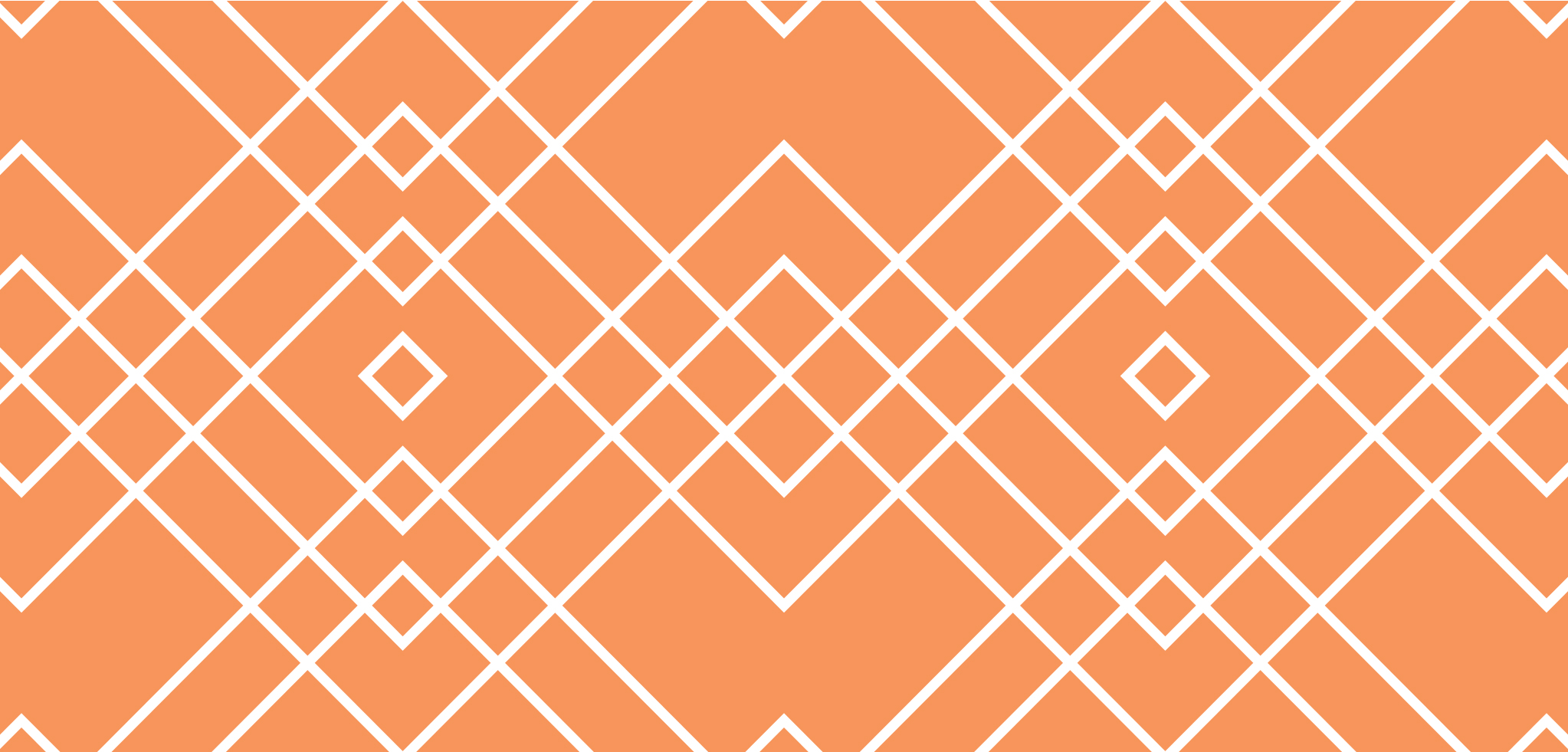
Masters Programs

Doctoral Programs

Certificate Programs

In the wake of the pandemic, many mathematical sciences departments have made at least short-term changes in their requirements regarding the GRE for individuals applying for admission to graduate programs. The Google doc USA/Canada Math PhD Programs: GRE requirements and Qualifying Exams , curated by Brown University graduate student Emily Winn, provides a list of those current requirements.
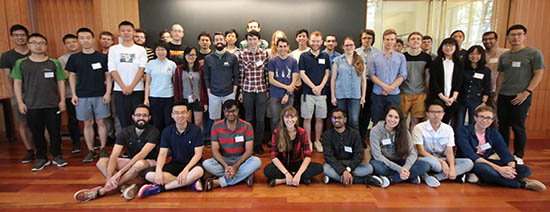
The department offers programs covering a broad range of topics leading to the Doctor of Philosophy and the Doctor of Science degrees (the student chooses which to receive; they are functionally equivalent). Candidates are admitted to either the Pure or Applied Mathematics programs but are free to pursue interests in both groups. Of the roughly 120 Ph.D. students, about 2/3 are in Pure Mathematics, 1/3 in Applied Mathematics.
The two programs in Pure and Applied Mathematics offer basic and advanced classes in analysis, algebra, geometry, Lie theory, logic, number theory, probability, statistics, topology, astrophysics, combinatorics, fluid dynamics, numerical analysis, mathematics of data, and the theory of computation. In addition, many mathematically-oriented courses are offered by other departments. Students in Applied Mathematics are especially encouraged to take courses in engineering and scientific subjects related to their research.
All students pursue research under the supervision of the faculty , and are encouraged to take advantage of the many seminars and colloquia at MIT and in the Boston area.
Degree Requirements
Degree requirements consist of:
- Oral qualifying exam
- Classroom teaching
- Original thesis and defense
Prospective students are invited to consult the graduate career timeline for more information, and to read about the application procedure .
Graduate Co-Chairs
Graduate Student Issues, math graduate admissions
Jonathan Kelner , Davesh Maulik , and Zhiwei Yun
The Graduate Program
The Department of Mathematics offers Ph.D. programs in Mathematics and Applied Mathematics. The department also supports students in the Graduate Group in Logic and the Methodology of Science , an interdisciplinary doctoral program shared between the departments of Philosophy and Mathematics. At this time, we no longer offer a terminal Master's degree program.
To review the policies and procedures of the Graduate Program, please refer to our Graduate Student Handbook .
Please note: Some Mathematics Advising Services have been moved to virtual platforms. You can find the latest information on UC Berkeley’s prevention and response efforts related to COVID-19 here.
Graduate Program Contacts
The Graduate Program is overseen by the Departmental Vice Chair for Graduate Affairs and the Graduate Student Affairs Officers.
- Professor Tom Scanlon, Vice Chair for Graduate Affairs
- Clay Calder, Graduate Student Affairs Officer
- Christian Natividad, Graduate Student Affairs Officer
- Vicky Lee, Director of Student Services
For Questions Regarding Math Graduate Admissions: Please see the Admissions web page here . After reviewing the admissions website, if you have further questions please email [email protected] .
Overview of the PhD Program
For specific information on the Applied Mathematics PhD program, see the navigation links to the right.
What follows on this page is an overview of all Ph.D. programs at the School; additional information and guidance can be found on the Graduate Policies pages.
General Ph.D. Requirements
- 10 semester-long graduate courses, including at least 8 disciplinary. At least 5 of the 10 should be graduate-level SEAS "technical" courses (or FAS graduate-level technical courses taught by SEAS faculty), not including seminar/reading/project courses. Undergraduate-level courses cannot be used. For details on course requirements, see the school's overall PhD course requirements and the individual program pages linked therein.
- Program Plan (i.e., the set of courses to be used towards the degree) approval by the Committee on Higher Degrees (CHD).
- Minimum full-time academic residency of two years .
- Serve as a Teaching Fellow (TF) in one semester of the second year.
- Oral Qualifying Examination Preparation in the major field is evaluated in an oral examination by a qualifying committee. The examination has the dual purpose of verifying the adequacy of the student's preparation for undertaking research in a chosen field and of assessing the student's ability to synthesize knowledge already acquired. For details on arranging your Qualifying Exam, see the exam policies and the individual program pages linked therein.
- Committee Meetings : PhD students' research committees meet according to the guidelines in each area's "Committee Meetings" listing. For details see the "G3+ Committee Meetings" section of the Policies of the CHD and the individual program pages linked therein.
- Final Oral Examination (Defense) This public examination devoted to the field of the dissertation is conducted by the student's research committee. It includes, but is not restricted to, a defense of the dissertation itself. For details of arranging your final oral exam see the Ph.D. Timeline page.
- Dissertation Upon successful completion of the qualifying examination, a committee chaired by the research supervisor is constituted to oversee the dissertation research. The dissertation must, in the judgment of the research committee, meet the standards of significant and original research.
Optional additions to the Ph.D. program
Harvard PhD students may choose to pursue these additional aspects:
- a Secondary Field (which is similar to a "minor" subject area). SEAS offers PhD Secondary Field programs in Data Science and in Computational Science and Engineering . GSAS lists secondary fields offered by other programs.
- a Master of Science (S.M.) degree conferred en route to the Ph.D in one of several of SEAS's subject areas. For details see here .
- a Teaching Certificate awarded by the Derek Bok Center for Teaching and Learning .
SEAS PhD students may apply to participate in the Health Sciences and Technology graduate program with Harvard Medical School and MIT. Please check with the HST program for details on eligibility (e.g., only students in their G1 year may apply) and the application process.

In Applied Mathematics
- First-Year Exploration
- Areas of Application
- AM & Economics
- How to Declare
- Who are my Advisors?
- Secondary Field
- Senior Thesis
- Research for Course Credit (AM 91R & AM 99R)
- AB/SM Information
- Peer Concentration Advisors (PCA) Program
- Student Organizations
- How to Apply
- PhD Timeline
- PhD Model Program (Course Guidelines)
- Oral Qualifying Examination
- Committee Meetings
- Committee on Higher Degrees
- Research Interest Comparison
- Collaborations
- Cross-Harvard Engagement
- Clubs & Organizations
- Centers & Initiatives
- Alumni Stories
Mathematical Sciences
Mellon college of science, ph.d. programs, doctor of philosophy in mathematical sciences.
Students seeking a Ph.D. in Mathematical Sciences are expected to show a broad grasp of mathematics and demonstrate a genuine ability to do mathematical research. The Doctor of Philosophy in Mathematical Sciences is a traditional research degree, and its requirements are representative of all doctoral programs.
After being admitted to graduate status by the Department, a student seeking a Ph.D. must be admitted to candidacy for this degree by fulfilling the appropriate program requirements.
The most important requirement for the Ph.D. degree is timely completion and public defense of an original Ph.D. thesis. The Ph.D. thesis is expected to display depth and originality and be publishable by a refereed journal.
Doctor of Arts in Mathematical Sciences
The Doctor of Arts degree shares all requirements and standards with the Ph.D., except with regard to the thesis. The D.A. thesis is not expected to display the sort of original research required for a Ph.D. thesis, but rather to demonstrate an ability to organize, understand, and present mathematical ideas in a scholarly way, usually with sufficient innovation and worth to produce a publishable work. Whenever practical, the department provides D.A. candidates with the opportunity to use materials developed to teach a course. While a typical Ph.D. recipient will seek a position that has a substantial research component, the D.A. recipient will usually seek a position where research is not central.
Doctor of Philosophy in Algorithms, Combinatorics, and Optimization (ACO)
This program is administered jointly by the Department of Mathematical Sciences, the Department of Computer Science, and the Tepper School of Business. It focuses on discrete mathematics and algorithmic issues arising in computer science and operations research, particularly the mathematical analysis of these issues. The participating units evaluate applicants separately. The requirements for this degree and information on participating faculty are available at the ACO page .
Doctor of Philosophy in Pure and Applied Logic (PAL)
This is an interdisciplinary program with faculty from the Department of Mathematical Sciences, the Department of Philosophy, and the School of Computer Science. The participating units evaluate applicants separately and set their own program requirements. Students who have been admitted to the PAL program, and who complete the requirements for the Ph.D. in Mathematical Sciences with a thesis in the area of logic, can choose to receive either a Ph.D. in Pure and Applied Logic or a Ph.D. in Mathematical Sciences. The choice of which degree to receive is usually based on the intended career path.
- Requirements
- Financial Aid & Employment Policies
- 2023-2024 Graduate Handbook
- MCS Graduate Education
- CMU Graduate Education
- Archived Handbooks
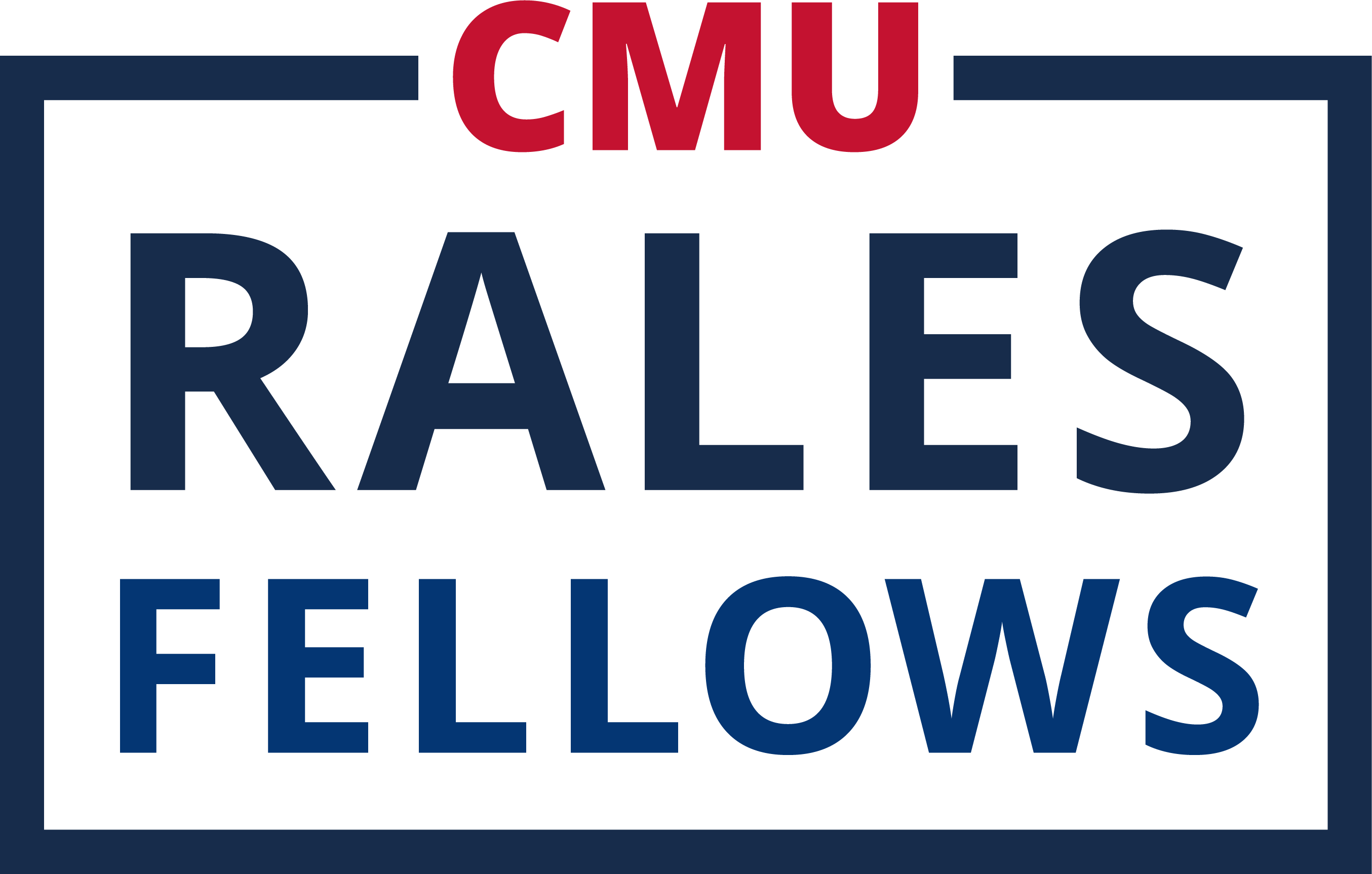
The CMU Rales Fellow Program is dedicated to developing a diverse community of STEM leaders from underrepresented and underresourced backgrounds by eliminating cost as a barrier to education. Learn more about this program for master's and Ph.D. students. Learn more
- Apply Now [GRAD]
- Apply Now [UNDERGRAD]
- TA and Grader Positions
- Computing Support
- Computational Finance
Ph.D. Degree Programs
The UCSD Mathematics Department admits students into the following Ph.D. programs:
- Ph.D. in Mathematics -- Pure or Applied Mathematics.
- Ph.D. in Mathematics with a Specialization in Computational Science .
- Ph.D. in Mathematics with a Specialization in Statistics .
In addition, the department participates in the following Ph.D. programs:
- Ph.D. in Bioinformatics .
- Ph.D. in Mathematics and Science Education (joint program between UCSD and SDSU).
For application information, go to How to Apply (Graduate) .
Ph.D. in Mathematics
The Ph.D. in Mathematics allows study in pure mathematics, applied mathematics and statistics. The mathematics department has over 60 faculty, approximately 100 Ph.D. students, and approximately 35 Masters students. A list of the UCSD mathematics faculty and their research interests can be found at here . The Ph.D. in Mathematics program produces graduates with a preparation in teaching and a broad knowledge of mathematics. Our students go on to careers as university professors, as well as careers in industry or government.
In the first and second years of study, Ph.D. students take courses in preparation for three written qualifying examinations (quals). One qual must be taken in Algebra or Topology, and another in Real or Complex Analysis. A third qual may be taken in Numerical Analysis or Statistics or one of the remaining topics in the first two groups. All three quals must be passed by the start of the third year. After the qualifying exams are passed, the student is expected to choose an advisor and follow a course of study agreed on by the two of them. At this point, the student chooses a thesis topic, finds a doctoral committee and presents a talk on his or her proposed research topic. If the committee is satisfied with this talk, the student has "Advanced to Candidacy." The student will then pursue their research agenda with their advisor until they have solved an original problem. The student will submit a written dissertation and reconvene his or her committee for a Final Defense. At the Final Defense, the student gives a seminar talk that is very similar to a talk that he or she might give for a job interview.
Nearly every admitted Ph.D. student gets financial support. The financial support is most commonly in the form of a Teaching Assistantship, however, Research Assistantships and other fellowships are also available.
Because of the large faculty to student ratio, graduate students have many opportunities to interact with faculty in courses or smaller research seminars. The graduate students also run their own "Food for Thought" seminar for expository talks as well as a research seminar where they give talks about their research.
UCSD has excellent library facilities with strong collections in mathematics, science, and engineering. Ph.D. students are provided with access to computer facilities and office space.
Full-time students are required to register for a minimum of twelve (12) units every quarter, eight (8) of which must be graduate-level mathematics courses taken for a letter grade only. The remaining four (4) units can be approved upper-division or graduate-level courses in mathematics-related subjects (MATH 500 may not be used to satisfy any part of this requirement). After advancing to candidacy, Ph.D. candidates may take all course work on a Satisfactory/Unsatisfactory basis. Typically, students should not enroll in MATH 299 (Reading and Research) until they have passed at least two Qualifying Examinations at the PhD or Provisional PhD level, or obtained approval of their faculty advisor.
Written Qualifying Examinations
Effective Fall Quarter 1998, the department made changes in their qualifying exam requirements with a view to:
- improving applied mathematics' access to students and the attractiveness of its program to applicants; and
- broadening the education of our doctoral students and leading more of them towards applied areas.
The department now offers written qualifying examinations in SEVEN (7) subjects. These are grouped into three areas as follows:
- Three qualifying examinations must be passed. At least one must be passed at the Ph.D. level and a second must be passed at either the Ph.D. or Provisional Ph.D. level.
- Of the three qualifying exams, there must be at least one from each of Areas 1 and 2.
- Students must pass at least two exams from distinct areas with a minimum grade of Provisional Ph.D. (For example, a Ph.D. pass in Real Analysis, Provisional Ph.D. pass in Complex Analysis, M.A. pass in Algebra would NOT satisfy this requirement, but a Ph.D. pass in Real Analysis, M.A. pass in Complex Analysis, Provisional Ph.D. pass in Algebra would, as would a Ph.D. pass in Numerical Analysis, Provisional Ph.D. pass in Applied Algebra, and M.A. pass in Real Analysis.) All exams must be passed by the September exam session prior to the beginning of the third year of graduate studies. (Thus, there is no limit on the number of attempts, encouraging new students to take exams when they arrive, without penalty.) Except for this deadline, there is no limit on the number of exams a student may attempt.
After qualifying exams are given, the faculty meet to discuss the results of the exams with the Qualifying Exam and Appeals Committee (QEAC). Exam grades are reported at one of four levels:
Department policy stipulates that at least one of the exams must be completed with a Provisional Ph.D. pass or better by September following the end of the first year. Anyone unable to complete this schedule will be terminated from the doctoral program and transferred to one of our Master's programs. Any grievances about exams or other matters can be brought before the Qualifying Exam and Appeals Committee for consideration.
Exams are typically offered twice a year, one scheduled late in the Spring Quarter and again in early September (prior to the start of Fall Quarter). Copies of past exams are available on the Math Graduate Student Handbook .
In choosing a program with an eye to future employment, students should seek the assistance of a faculty advisor and take a broad selection of courses including applied mathematics, such as those in Area 3.
Master's Transferring to Ph.D.
Any student who wishes to transfer from masters to the Ph.D. program will submit their full admissions file as Ph.D. applicants by the regular closing date for all Ph.D. applicants (end of the fall quarter/beginning of winter quarter). It is the student's responsibility to submit their files in a timely fashion, no later than the closing date for Ph.D. applications at the end of the fall quarter of their second year of masters study, or earlier. The candidate is required to add any relevant materials to their original masters admissions file, such as most recent transcript showing performance in our graduate program. Letters of support from potential faculty advisors are encouraged. The admissions committee will either recommend the candidate for admission to the Ph.D. program, or decline admission. In the event of a positive recommendation, the Qualifying Exam Committee checks the qualifying exam results of candidates to determine whether they meet the appropriate Ph.D. program requirements, at the latest by the fall of the year in which the application is received. For students in the second year of the master's program, it is required that the student has secured a Ph.D. advisor before admission is finalized. An admitted student is supported in the same way as continuing Ph.D. students at the same level of advancement are supported. Transferring from the Master's program may require renewal of an I-20 for international students, and such students should make their financial plans accordingly. To be eligible for TA support, non-native English speakers must pass the English exam administered by the department in conjunction with the Teaching + Learning Commons.
Foreign Language Requirement
There is no Foreign Language requirement for the Ph.D. in Mathematics.
Advancement to Candidacy
It is expected that by the end of the third year (9 quarters), students should have a field of research chosen and a faculty member willing to direct and guide them. A student will advance to candidacy after successfully passing the oral qualifying examination, which deals primarily with the area of research proposed but may include the project itself. This examination is conducted by the student's appointed doctoral committee. Based on their recommendation, a student advances to candidacy and is awarded the C. Phil. degree.
Dissertation and Final Defense
Submission of a written dissertation and a final examination in which the thesis is publicly defended are the last steps before the Ph.D. degree is awarded. When the dissertation is substantially completed, copies must be provided to all committee members at least four weeks in advance of the proposed defense date. Two weeks before the scheduled final defense, a copy of the dissertation must be made available in the Department for public inspection.
Time Limits
The normative time for the Ph.D. in mathematics is five (5) years. Students must be advanced to candidacy by the end of eleven (11) quarters. Total university support cannot exceed six (6) years. Total registered time at UCSD cannot exceed seven (7) years.
It may be useful to describe what the majority of students who have successfully completed their Ph.D. and obtained an academic job have done. In the past some students have waited until the last time limit before completing their qualifying exams, finding an advisor or advancing to candidacy. We strongly discourage this, because experience suggests that such students often do not complete the program. Although these are formal time limits, the general expectation is that students pass two qualifying exams, one at the Ph.D. level and one at the masters level by the beginning of their second year. (About half of our students accomplish this.) In the second year, a student begins taking reading courses so that they become familiar with the process of doing research and familiarize themselves with a number of faculty who may serve as their advisor. In surveying our students, on average, a student takes 4 to 5 reading courses before finding an advisor. Optimally, a student advances to candidacy sometime in their third year. This allows for the fourth and fifth year to concentrate on research and produce a thesis. In contrast to coursework, research is an unpredictable endeavor, so it is in the interest of the student to have as much time as possible to produce a thesis.
A student is also a teaching assistant in a variety of courses to strengthen their resume when they apply for a teaching job. Students who excel in their TA duties and who have advanced to candidacy are selected to teach a course of their own as an Associate Instructor. Because there are a limited number of openings to become an Associate Instructor, we highly recommend that you do an outstanding job of TAing in a large variety of courses and advance to candidacy as soon as possible to optimize your chances of getting an Associate Instructorship.

9500 Gilman Drive, La Jolla, CA 92093-0112
(858) 534-3590
PhD in Mathematics
The PhD in Mathematics provides training in mathematics and its applications to a broad range of disciplines and prepares students for careers in academia or industry. It offers students the opportunity to work with faculty on research over a wide range of theoretical and applied topics.
Degree Requirements
The requirements for obtaining an PhD in Mathematics can be found on the associated page of the BU Bulletin .
- Courses : The courses mentioned on the BU Bulletin page can be chosen from the graduate courses we offer here . Half may be at the MA 500 level or above, but the rest must be at the MA 700 level or above. Students can also request to use courses from other departments to satisfy some of these requirements. Please contact your advisor for more information about which courses can be used in this way. All courses must be passed with a grade of B- or higher.
- Analysis (examples include MA 711, MA 713, and MA 717)
- PDEs and Dynamical Systems (examples include MA 771, MA 775, and MA 776)
- Algebra and Number Theory (examples include MA 741, MA 742, and MA 743)
- Topology (examples include MA 721, MA 722, and MA 727)
- Geometry (examples include MA 725, MA 731, and MA 745)
- Probability and Stochastic Processes (examples include MA 779, MA 780, and MA 783)
- Applied Mathematics (examples include MA 750, MA 751, and MA 770)
- Comprehensive Examination : This exam has both a written and an oral component. The written component consists of an expository paper of typically fifteen to twenty-five pages on which the student works over a period of a few months under the guidance of the advisor. The topic of the expository paper is chosen by the student in consultation with the advisor. On completion of the paper, the student takes an oral exam given by a three-person committee, one of whom is the student’s advisor. The oral exam consists of a presentation by the student on the expository paper followed by questioning by the committee members. A student who does not pass the MA Comprehensive Examination may make a second attempt, but all students are expected to pass the exam no later than the end of the summer following their second year.
- Oral Qualifying Examination: The topics for the PhD oral qualifying exam correspond to the two semester courses taken by the student from one of the 3 subject areas and one semester course each taken by the student from the other two subject areas. In addition, the exam begins with a presentation by the student on some specialized topic relevant to the proposed thesis research. A student who does not pass the qualifying exam may make a second attempt, but all PhD students are expected to pass the exam no later than the end of the summer following their third year.
- Dissertation and Final Oral Examination: This follows the GRS General Requirements for the Doctor of Philosophy Degree .
Admissions information can be found on the BU Arts and Sciences PhD Admissions website .
Financial Aid
Our department funds our PhD students through a combination of University fellowships, teaching fellowships, and faculty research grants. More information will be provided to admitted students.
More Information
Please reach out to us directly at [email protected] if you have further questions.

- Admission Policies
- Financial Support
- Ph.D. in Atmosphere Ocean Science
- M.S. at Graduate School of Arts & Science
- M.S. at Tandon School of Engineering
- Current Students
Ph.D. Program in Mathematics
Degree requirements.
A candidate for the Ph.D. degree in mathematics must fulfill a number of different departmental requirements.
NYU Shanghai Ph.D. Track
The Ph.D. program also offers students the opportunity to pursue their study and research with Mathematics faculty based at NYU Shanghai. With this opportunity, students generally complete their coursework in New York City before moving full-time to Shanghai for their dissertation research. For more information, please visit the NYU Shanghai Ph.D. page .
Sample course schedules (Years 1 and 2) for students with a primary interest in:
Applied Math (Math Biology, Scientific Computing, Physical Applied Math, etc.)
Additional information for students interested in studying applied math is available here .
Probability
PDE/Analysis
The Written Comprehensive Examination
The examination tests the basic knowledge required for any serious mathematical study. It consists of the three following sections: Advanced Calculus, Complex Variables, and Linear Algebra. The examination is given on three consecutive days, twice a year, in early September and early January. Each section is allotted three hours and is written at the level of a good undergraduate course. Samples of previous examinations are available in the departmental office. Cooperative preparation is encouraged, as it is for all examinations. In the fall term, the Department offers a workshop, taught by an advanced Teaching Assistant, to help students prepare for the written examinations.
Entering students with a solid preparation are encouraged to consider taking the examination in their first year of full-time study. All students must take the examinations in order to be allowed to register for coursework beyond 36 points of credit; it is recommended that students attempt to take the examinations well before this deadline. Graduate Assistants are required to take the examinations during their first year of study.
For further details, consult the page on the written comprehensive exams .
The Oral Preliminary Examination
This examination is usually (but not invariably) taken after two years of full-time study. The purpose of the examination is to determine if the candidate has acquired sufficient mathematical knowledge and maturity to commence a dissertation. The phrase "mathematical knowledge" is intended to convey rather broad acquaintance with the basic facts of mathematical life, with emphasis on a good understanding of the simplest interesting examples. In particular, highly technical or abstract material is inappropriate, as is the rote reproduction of information. What the examiners look for is something a little different and less easy to quantify. It is conveyed in part by the word "maturity." This means some idea of how mathematics hangs together; the ability to think a little on one's feet; some appreciation of what is natural and important, and what is artificial. The point is that the ability to do successful research depends on more than formal learning, and it is part of the examiners' task to assess these less tangible aspects of the candidate's preparation.
The orals are comprised of a general section and a special section, each lasting one hour, and are conducted by two different panels of three faculty members. The examination takes place three times a year: fall, mid-winter and late spring. Cooperative preparation of often helpful and is encouraged. The general section consists of five topics, one of which may be chosen freely. The other four topics are determined by field of interest, but often turn out to be standard: complex variables, real variables, ordinary differential equations, and partial differential equations. Here, the level of knowledge that is expected is equivalent to that of a one or two term course of the kind Courant normally presents. A brochure containing the most common questions on the general oral examination, edited by Courant students, is available at the Department Office.
The special section is usually devoted to a single topic at a more advanced level and extent of knowledge. The precise content is negotiated with the candidate's faculty advisor. Normally, the chosen topic will have a direct bearing on the candidate's Ph.D. dissertation.
All students must take the oral examinations in order to be allowed to register for coursework beyond 60 points of credit. It is recommended that students attempt the examinations well before this deadline.
The Dissertation Defense
The oral defense is the final examination on the student's dissertation. The defense is conducted by a panel of five faculty members (including the student's advisor) and generally lasts one to two hours. The candidate presents his/her work to a mixed audience, some expert in the student's topic, some not. Often, this presentation is followed by a question-and-answer period and mutual discussion of related material and directions for future work.
Summer Internships and Employment
The Department encourages Ph.D. students at any stage of their studies, including the very early stage, to seek summer employment opportunities at various government and industry facilities. In the past few years, Courant students have taken summer internships at the National Institute of Health, Los Alamos National Laboratory, Woods Hole Oceanographic Institution, Lawrence Livermore National Laboratory and NASA, as well as Wall Street firms. Such opportunities can greatly expand students' understanding of the mathematical sciences, offer them possible areas of interest for thesis research, and enhance their career options. The Director of Graduate Studies and members of the faculty (and in particular the students' academic advisors) can assist students in finding appropriate summer employment.
Mentoring and Grievance Policy
For detailed information, consult the page on the Mentoring and Grievance Policy .
Visiting Doctoral Students
Information about spending a term at the Courant Institute's Department of Mathematics as a visiting doctoral student is available on the Visitor Programs page.

- Doing a PhD in Mathematics
- Doing a PhD
What Does a PhD in Maths Involve?
Maths is a vast subject, both in breadth and in depth. As such, there’s a significant number of different areas you can research as a math student. These areas usually fall into one of three categories: pure mathematics, applied mathematics or statistics. Some examples of topics you can research are:
- Number theory
- Numerical analysis
- String theory
- Random matrix theory
- Graph theory
- Quantum mechanics
- Statistical forecasting
- Matroid theory
- Control theory
Besides this, because maths focuses on addressing interdisciplinary real-world problems, you may work and collaborate with other STEM researchers. For example, your research topic may relate to:
- Biomechanics and transport processes
- Evidence-based medicine
- Fluid dynamics
- Financial mathematics
- Machine learning
- Theoretical and Computational Optimisation
What you do day-to-day will largely depend on your specific research topic. However, you’ll likely:
- Continually read literature – This will be to help develop your knowledge and identify current gaps in the overall body of knowledge surrounding your research topic.
- Undertake research specific to your topic – This can include defining ideas, proving theorems and identifying relationships between models.
- Collect and analyse data – This could comprise developing computational models, running simulations and interpreting forecasts etc.
- Liaise with others – This could take many forms. For example, you may work shoulder-to-shoulder with individuals from different disciplines supporting your research, e.g. Computer scientists for machine learning-based projects. Alternatively, you may need frequent input from those who supplied the data for your research, e.g. Financial institutions or biological research colleagues.
- Attend a wide range of lectures, seminars and events.
Browse PhD Opportunities in Mathematics
Application of artificial intelligence to multiphysics problems in materials design, study of the human-vehicle interactions by a high-end dynamic driving simulator, physical layer algorithm design in 6g non-terrestrial communications, machine learning for autonomous robot exploration, detecting subtle but clinically significant cognitive change in an ageing population, how long does it take to get a phd in maths.
The average programme duration for a mathematics PhD in the UK is 3 to 4 years for a full-time studying. Although not all universities offer part-time maths PhD programmes, those that do have a typical programme duration of 5 to 7 years.
Again, although the exact arrangement will depend on the university, most maths doctorates will require you to first register for an MPhil . At the end of your first year, your supervisor will assess your progress to decide whether you should be registered for a PhD.
Additional Learning Modules

Some Mathematics departments will require you to enrol on to taught modules as part of your programme. These are to help improve your knowledge and understanding of broader subjects within your field, for example, Fourier Analysis, Differential Geometry and Riemann Surfaces. Even if taught modules aren’t compulsory in several universities, your supervisor will still encourage you to attend them for your development.
Most UK universities will also have access to specialised mathematical training courses. The most common of these include Pure Mathematics courses hosted by Mathematics Access Grid Conferencing ( MAGIC ) and London Taught Course Centre ( LTCC ) and Statistics courses hosted by Academy for PhD Training in Statistics ( APTS ).
What Are the Typical Entry Requirements for A PhD in Maths?
In the UK, the typical entry requirements for a Maths PhD is an upper second-class (2:1) Master’s degree (or international equivalent) in Mathematics or Statistics [1] .
However, there is some variation on this. From writing, the lowest entry requirement is an upper second-class (2:1) Bachelor’s degree in any math-related subject. The highest entry requirement is a first-class (1st) honours Master’s degree in a Mathematics or Statistics degree only.
It’s worth noting if you’re applying to a position which comes with funding provided directly by the Department, the entry requirements will usually be on the higher side because of their competitiveness.
In terms of English Language requirements, most mathematics departments require at least an overall IELTS (International English Language Testing System) score of 6.5, with no less than 6.0 in each individual subtest.
Tips to Consider when Making Your Application
When applying to any mathematics PhD, you’ll be expected to have a good understanding of both your subject field and the specific research topic you are applying to. To help show this, it’s advisable that you demonstrate recent engagement in your research topic. This could be by describing the significance of a research paper you recently read and outlining which parts interested you the most, and why. Additionally, you can discuss a recent mathematics event you attended and suggest ways in how what you learnt might apply to your research topic.
As with most STEM PhDs, most maths PhD professors prefer you to discuss your application with them directly before putting in a formal application. The benefits of this is two folds. First, you’ll get more information on what their department has to offer. Second, the supervisor can better discover your interest in the project and gauge whether you’d be a suitable candidate. Therefore, we encourage you to contact potential supervisors for positions you’re interested in before making any formal applications.
How Much Does a Maths PhD Typically Cost?
The typical tuition fee for a PhD in Maths in the UK is £4,407 per year for UK/EU students and £20,230 per year for international students. This, alongside the range in tuition fees you can expect, is summarised below:
Note: The above tuition fees are based on 12 UK Universities [1] for 2020/21 Mathematic PhD positions. The typical fee has been taken as the median value.
In addition to the above, it’s not unheard of for research students to be charged a bench fee. In case you’re unfamiliar with a bench fee, it’s an annual fee additional to your tuition, which covers the cost of specialist equipment or resources associated with your research. This can include the upkeep of supercomputers you may use, training in specialist analysis software, or travelling to conferences. The exact fee will depend on your specific research topic; however, it should be minimal for most mathematic projects.
What Specific Funding Opportunities Are There for A PhD in Mathematics?
Alongside the usual funding opportunities available to all PhD Research students such as doctoral loans, departmental scholarships, there are a few other sources of funding available to math PhD students. Examples of these include:
You can find more information on these funding sources here: DiscoverPhDs funding guide .
What Specific Skills Do You Gain from Doing a PhD in Mathematics?
A doctorate in Mathematics not only demonstrates your commitment to continuous learning, but it also provides you with highly marketable skills. Besides subject-specific skills, you’ll also gain many transferable skills which will prove useful in almost all industries. A sample of these skills is listed below.
- Logical ability to consider and analyse complex issues,
- Commitment and persistence towards reaching research goals,
- Outstanding verbal and written skills,
- Strong attention to detail,
- The ability to liaise with others from unique disciple backgrounds and work as part of a team
- Holistic deduction and reasoning skills,
- Forming and explaining mathematical and logical solutions to a wide range of real-world problems,
- Exceptional numeracy skills.
What Jobs Can You Get with A Maths PhD?

One of the greatest benefits maths PostDocs will have is the ability to pursue a wide range of career paths. This is because all sciences are built on core principles which, to varying extents, are supported by the core principles of mathematics. As a result, it’s not uncommon to ask students what path they intend to follow after completing their degree and receive entirely different answers. Although not extensive by any means, the most common career paths Math PostDocs take are listed below:
- Academia – Many individuals teach undergraduate students at the university they studied at or ones they gained ties to during their research. This path is usually the preferred among students who want to continue focusing on mathematical theories and concepts as part of their career.
- Postdoctoral Researcher – Others continue researching with their University or with an independent organisation. This can be a popular path because of the opportunities it provides in collaborative working, supervising others, undertaking research and attending conferences etc.
- Finance – Because of their deepened analytical skills, it’s no surprise that many PostDocs choose a career in finance. This involves working for some of the most significant players in the financial district in prime locations including London, Frankfurt and Hong Kong. Specific job titles can include Actuarial, Investment Analyst or Risk Modeller.
- Computer Programming – Some students whose research involves computational mathematics launch their career as a computer programmer. Due to their background, they’ll typically work on specialised projects which require high levels of understanding on the problem at hand. For example, they may work with physicists and biomedical engineers to develop a software package that supports their more complex research.
- Data Analyst – Those who enjoy number crunching and developing complex models often go into data analytics. This can involve various niches such as forecasting or optimisation, across various fields such as marketing and weather.
What Are Some of The Typical Employers Who Hire Maths PostDocs?
As mentioned above, there’s a high demand for skilled mathematicians and statisticians across a broad range of sectors. Some typical employers are:
- Education – All UK and international universities
- Governments – STFC and Department for Transport
- Healthcare & Pharmaceuticals – NHS, GSK, Pfizer
- Finance & Banking – e.g. Barclays Capital, PwC and J. P. Morgan
- Computing – IBM, Microsoft and Facebook
- Engineering – Boeing, Shell and Dyson
The above is only a small selection of employers. In reality, mathematic PostDocs can work in almost any industry, assuming the role is numerical-based or data-driven.

How Much Can You Earn with A PhD in Maths?
As a mathematics PhD PostDoc, your earning potential will mostly depend on your chosen career path. Due to the wide range of options, it’s impossible to provide an arbitrary value for the typical salary you can expect.
However, if you pursue one of the below paths or enter their respective industry, you can roughly expect to earn [3] :
Academic Lecturer
- Approximately £30,000 – £35,000 starting salary
- Approximately £40,000 with a few years experience
- Approximately £45,000 – £55,000 with 10 years experience
- Approximately £60,000 and over with significant experience and a leadership role. Certain academic positions can earn over £80,000 depending on the management duties.
Actuary or Finance
- Approximately £35,000 starting salary
- Approximately £45,000 – £55,000 with a few years experience
- Approximately £70,000 and over with 10 years experience
- Approximately £180,000 and above with significant experience and a leadership role.
Aerospace or Mechanical Engineering
- Approximately £28,000 starting salary
- Approximately £35,000 – £40,000 with a few years experience
- Approximately £60,000 and over with 10 years experience
Data Analyst
- Approximately £45,000 – £50,000 with a few years experience
- Approximately £90,000 and above with significant experience and a leadership role.
Again, we stress that the above are indicative values only. Actual salaries will depend on the specific organisation and position and responsibilities of the individual.
Facts and Statistics About Maths PhD Holders
The below chart provides useful insight into the destination of Math PostDocs after completing their PhD. The most popular career paths from other of highest to lowest is education, information and communication, finance and scientific research, manufacturing and government.

Note: The above chart is based on ‘UK Higher Education Leavers’ data [2] between 2012/13 and 2016/17 and contains a data size of 200 PostDocs. The data was obtained from the Higher Education Statistics Agency ( HESA ).
Which Noteworthy People Hold a PhD in Maths?
Alan turing.

Alan Turing was a British Mathematician, WW2 code-breaker and arguably the father of computer science. Alongside his lengthy list of achievements, Turning achieved a PhD in Mathematics at Princeton University, New Jersey. His thesis titled ‘Systems of Logic Based on Ordinals’ focused on the concepts of ordinal logic and relative computing; you can read it online here . To this day, Turning pioneering works continues to play a fundamental role in shaping the development of artificial intelligence (AI).
Ruth Lawrence
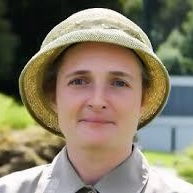
Ruth Lawrence is a famous British–Israeli Mathematician well known within the academic community. Lawrence earned her PhD in Mathematics from Oxford University at the young age of 17! Her work focused on algebraic topology and knot theory; you can read her interesting collection of research papers here . Among her many contributions to Maths, her most notable include the representation of the braid groups, more formally known as Lawrence–Krammer representations.
Emmy Noether

Emmy Noether was a German mathematician who received her PhD from the University of Erlangen, Germany. Her research has significantly contributed to both abstract algebra and theoretical physics. Additionally, she proved a groundbreaking theorem important to Albert Einstein’s general theory of relativity. In doing so, her theorem, Noether’s theorem , is regarded as one of the most influential developments in physics.
Other Useful Resources
Institute of Mathematics and its Applications (IMA) – IMA is the UK’s professional body for mathematicians. It contains a wide range of useful information, from the benefits of further education in Maths to details on grants and upcoming events.
Maths Careers – Math Careers is a site associated with IMA that provides a wide range of advice to mathematicians of all ages. It has a section dedicated to undergraduates and graduates and contains a handful of information about progressing into research.
Resources for Graduate Students – Produced by Dr Mak Tomford, this webpage contains an extensive collection of detailed advice for Mathematic PhD students. Although the site uses US terminology in places, don’t let that put you off as this resource will prove incredibly helpful in both applying to and undertaking your PhD.
Student Interviews – Still wondering whether a PhD is for you? If so, our collection of PhD interviews would be a great place to get an insider perspective. We’ve interviewed a wide range of PhD students across the UK to find out what doing a PhD is like, how it’s helped them and what advice they have for other prospective students who may be thinking of applying to one. You can read our insightful collection of interviews here .
[1] Universities used to determine the typical (median) and range of entry requirements and tuition fees for 2020/21 Mathematics PhD positions.
- http://www.lse.ac.uk/study-at-lse/Graduate/Degree-programmes-2020/MPhilPhD-Mathematics
- https://www.ox.ac.uk/admissions/graduate/courses/dphil-mathematics?wssl=1
- https://www.graduate.study.cam.ac.uk/courses/directory/mapmpdpms
- https://www.ucl.ac.uk/prospective-students/graduate/research-degrees/mathematics-mphil-phd
- http://www.bristol.ac.uk/study/postgraduate/2020/sci/phd-mathematics/
- https://www.surrey.ac.uk/postgraduate/mathematics-phd
- https://www.maths.ed.ac.uk/school-of-mathematics/studying-here/pgr/phd-application
- https://www.lancaster.ac.uk/study/postgraduate/postgraduate-courses/mathematics-phd/
- https://www.sussex.ac.uk/study/phd/degrees/mathematics-phd
- https://www.manchester.ac.uk/study/postgraduate-research/programmes/list/05325/phd-pure-mathematics/
- https://warwick.ac.uk/study/postgraduate/research/courses-2020/mathematicsphd/
- https://www.exeter.ac.uk/pg-research/degrees/mathematics/
[2] Higher Education Leavers Statistics: UK, 2016/17 – Outcomes by subject studied – https://www.hesa.ac.uk/news/28-06-2018/sfr250-higher-education-leaver-statistics-subjects
[3] Typical salaries have been extracted from a combination of the below resources. It should be noted that although every effort has been made to keep the reported salaries as relevant to Math PostDocs as possible (i.e. filtering for positions which specify a PhD qualification as one of their requirements/preferences), small inaccuracies may exist due to data availability.
Browse PhDs Now
Join thousands of students.
Join thousands of other students and stay up to date with the latest PhD programmes, funding opportunities and advice.

- University of Pennsylvania
- School of Arts and Sciences
- Penn Calendar
Department of Mathematics
Search form.

Graduate Program
Thinking of applying to graduate school in mathematics.
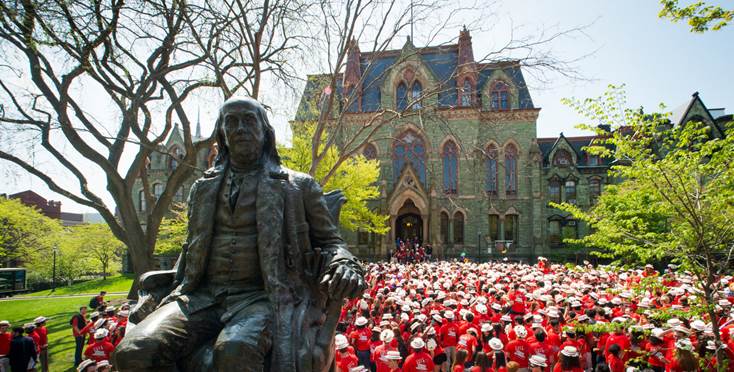
Penn was ranked 8th among all US universities in a leading national study , and our mathematics graduate program was recently highest in a study of graduate programs in arts and sciences at Penn. We have a very active and involved mathematics faculty , diverse course offerings and a broad seminar schedule , with a variety of research projects and strengths in algebra, analysis, geometry-topology, combinatorics, logic, probability, and mathematical physics. We have a supportive atmosphere, with personal attention from the faculty and extensive interaction among graduate students. Our grad students can take courses not only in the Mathematics Department but also elsewhere at Penn, and the wide resources of the university are available. Our former graduate students have gone on to mathematical careers both in academia and in industry.
Our full-time Ph.D. students receive a generous and competitive support package including
- five years of funding with a combination of fellowships and teaching assistantships;
- a stipend and a full tuition scholarship;
- no teaching responsibilities for at least two years (generally including the first and fourth year);
- health insurance coverage provided at no cost to the student.
We invite you to learn about our graduate program, our math department, our university and living in Philadelphia, a cosmopolitan city and a true mathematical hub, with easy access to nearby mathematics departments and research institutes.
We are looking for interested, mathematically talented and dedicated students to be a part of our group of excellent future mathematicians. Consider applying to Penn for your graduate education. Questions?
MATH8V02 - Individual Instruction in Mathematics
MATH 8V02 Individual Instruction in Mathematics (1-6 semester credit hours) Pass/Fail only. May be repeated for credit as topics vary. Instructor consent required. ([1-6]-0) S
When the PhD path leads to career struggles

A doctoral degree is a major commitment. Think carefully.
I appreciated reading Kara Miller’s The Big Idea column “PhD: Pretty heavily disappointed” (Business, May 22), about people with doctoral degrees struggling to build careers in academia. It made me think back to a conversation I had when I was about to graduate from high school.
I happened to run into a former track coach of mine, and as we were reminiscing he asked me what I planned as a major in college. “History,” I responded. He said, “Why don’t you take some computer classes also? It never hurts to be able to do something useful.”
I did not reflect on his motivation at the time, but my track coach was a young guy, and he was probably giving me advice straight from his own life, as a parent trying to raise his own young children. I did take computer classes in college and ultimately received a PhD in chemical engineering. I always remember that conversation as being a kind of turning point.
Earning a doctoral degree is a life commitment of great proportion. It can take, as Miller notes, between four and seven years. If we think of working life as roughly between the ages of 22 and 65, then a PhD requires more than 10 percent of a person’s working life. People need to think carefully about that investment.
Advertisement
Two powerful arguments in favor of the path of science, technology, engineering, and math are that there tend to be more STEM jobs for PhDs, and many universities’ STEM departments are generous in covering their PhD students’ tuition and cost of studies, including a stipend toward food, rent, and other expenses.
Stuart Gallant
Not much has changed in 30 years
As I prepared to graduate in 1995 with a doctor of education degree from the Harvard Graduate School of Education, my mother memorably said to me, “Of my four children, you are the one with the most education and the smallest salary.” Apparently not much has changed in 30 years.
I must congratulate these students, however, on following their passion rather than following the money. I can’t help but think that their lives, though stressful, may contain greater happiness.
Peggy Clark
Lawyers & electricians & philosophers, oh my!
Kara Miller’s column on the career challenges for people with doctoral degrees generated more than 260 comments on Boston.Globe.com. The following is an edited sample of readers’ reactions:
Lots of law school grads are underemployed as well. (PL)
So true, PL. The market in Massachusetts is flooded with talented lawyers seeking work. (Roforma)
Supply and demand, the market at work. (guk)
Investing in education and research in all fields is the hallmark of a society with staying power. Disinvesting from these endeavors signals decline and decay. (Massachusetts citizen)
Electricians, plumbers, mechanics, and other skilled technical professions have no problems getting $100k jobs with great benefits. (ramsen)
Not enough turnover from tenured professors, leaving little space for new faculty. Although the tenured, well-established professors are needed, it’s the junior faculty who are hungry and with new ideas that help build new programs. The whole graduate program model is a bad model. I worked two jobs, had my tuition and some type of minimal student health insurance and could barely cover the rent with my stipend, and the second job paid for everything else. Though I was working on many faculty projects, it was the faculty who said this would be good for me. Never did they say it was also good for them. (TravelerofNJ2)
I just retired from a tenured faculty position in science. I’m in my early 70s. I have colleagues who are still doing what they do well into their 70s, a couple approaching 80. There is no active incentive from the university to move the older faculty on, to make way for a new generation. (Lola-lola)
The next step is for adjuncts to go on strike across the nation and hold colleges and universities accountable. The current system is completely absurd. (Wordsmith2358)
Universities should be required to release disclosure data about the fate of their PhD graduates. (davidman820)
I knew an attorney who managed a Cheesecake Factory. She had worked in food services through school. As an attorney, she really did not make that much money and was not doing the field of law of her choice. How many real estate closings can you do without dying of boredom? She went into management in the food industry and makes the same salary. (Antietem)
It was always a question and puzzling to me why people study philosophy. (Blazer27)

Globe Opinion
Admissions Visit Opportunities
The Charger Blog
Unique Program Introduces Middle School Students to Math and Coding
The University’s Excellence in Math and Coding Chargers (E = MC2) was a fun after-school program for Engineering and Science University Magnet School students, offering them a sampling of math, coding, and life as a college student.
May 29, 2024
By Renee Chmiel, Office of Marketing and Communications
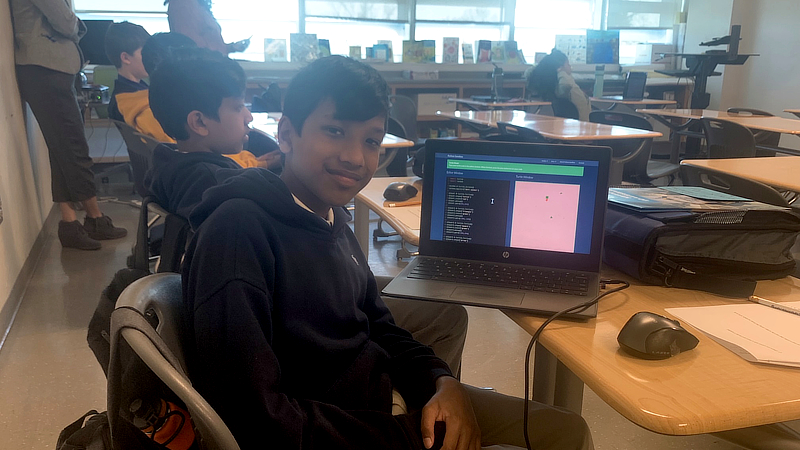
Srimahitha Kanakamedala used a 3D printer in the University of New Haven's makerspace to create a cryptography wheel, a cryptography tool that she later used in the classroom. Though she's only in eighth grade, she's already learning about math and coding from University of New Haven professors – and discovering the opportunities that will be available to her when she's in college.
Kanakamedala's family taught her about coding when she was very young. It has been something she enjoyed, and she wanted to keep building her skills. That's why she took part in the University's Excellence in Math and Coding Chargers (E = MC2), an immersive after-school program. She's one of more than a dozen Engineering and Science University Magnet School (ESUMS) students in grades 6-8 who took part in the program.
As part of her final coding project, Kanakamedala used code to generate three-digit numbers, creating "riddles" with numbers. She says she enjoyed getting to add to her math and coding education, going beyond what she was already doing in the classroom.
"This was a good opportunity to do more with coding outside of school," she explains. "The teachers were very nice. Making the crypto wheel was my favorite thing we did. It was cool."
Held at ESUMS, which is located adjacent to the University's West Haven campus, the program brought University professors to the magnet school. It was co-directed by Yevgeniya Rivers, Ed.D. , a senior lecturer and director of the University's Math Zone , and Yasanthi Kottegoda, Ph.D. , an associate professor. They designed it to introduce middle school students to areas of math that are accessible to them at their age but that are also challenging.
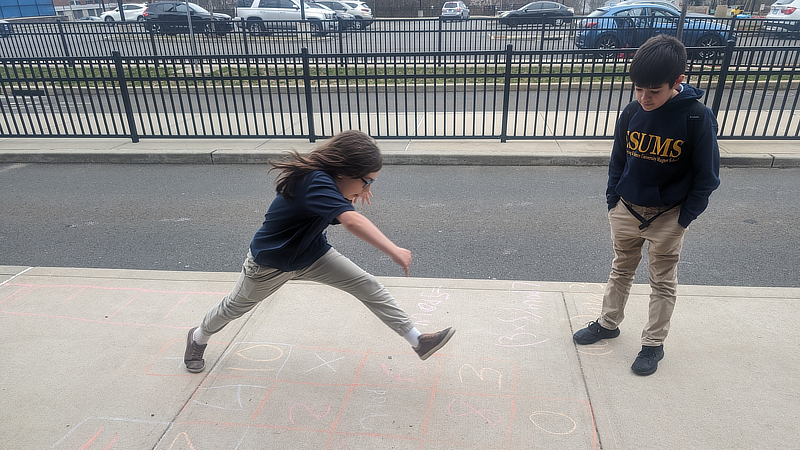
The program introduced students to a variety of topics, such as cryptography, statistics, and logical fallacies. Dr. Rivers describes it as a sort of "choose your own adventure" program, as students design their own final project and presentation.
"As an educator, I enjoy working with the kids," said Dr. Rivers. "They come after a full day of school, and they're full of energy. We're also creating relationships between University faculty, teachers, and the students and their families."
Dr. Kottegoda taught sessions on cryptography and graph theory. Committed to creating fun and engaging learning opportunities for her young students, she especially enjoyed introducing them to new concepts such as number theory.
"One of our main intentions was to introduce interesting math topics with real-world applications that middle school students often don't have the chance to get exposed to," she said. "It was quite entertaining and rewarding to see how they incorporated ideas we discussed in an outdoor hopscotch game. It was an amazing learning experience for me as well in terms of experimenting with various teaching techniques that support learning for students in this age group."
The program endeavored to reinforce the connection between math and computer science while helping students to learn about the many careers that incorporate math and coding. It was also a unique opportunity for the participants to get a taste of college life, whether they were learning from professors, visiting campus, or interacting with University of New Haven students.
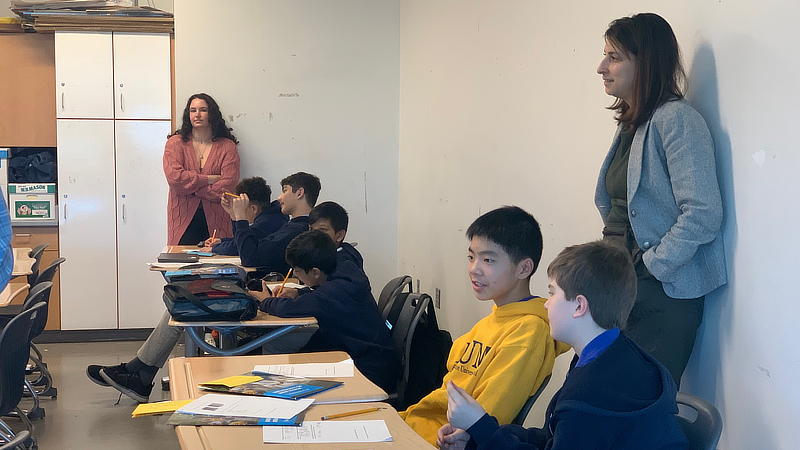
Charly Hilliard '25 served as a teaching assistant in the program. A forensic science major , she is minoring in math , and she enjoyed sharing her interest in math with the students. She says being a part of the program was a great way to connect with the West Haven community while also learning how to explain challenging concepts so that they are accessible.
"It's been great to see the growth from the kids in terms of their behavior and engagement," she said. "They've learned about topics that some people don't see until they get to college. It's great to see them interested and willing to learn these concepts."
Houssein El Turkey, Ph.D. , enjoyed teaching classes to the middle school students as part of the program. An associate professor, he helped them learn to think mathematically and to develop their creative program-solving skills.
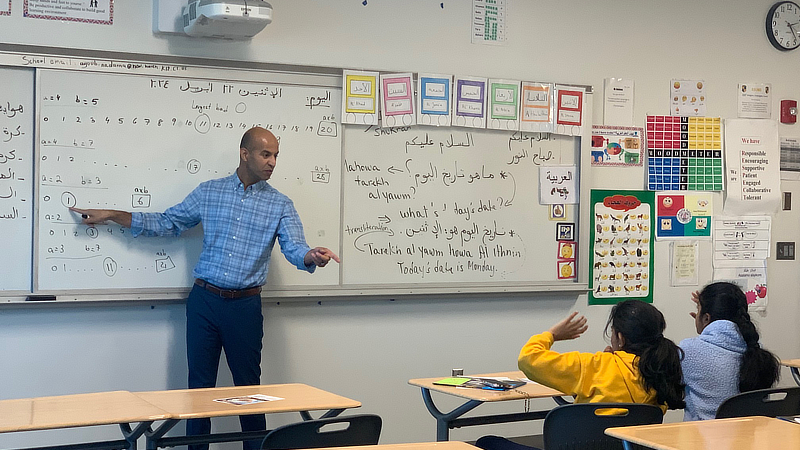
"This process is the epitome of what mathematicians do in their fields, and I was able to model that with middle schoolers," he said. "It was a privilege and an honor to serve as an instructor in the program and to see how it impacted many of the kids in the program. I think they got a sense and a taste of advanced mathematics, and I have the impression that they enjoyed it! I loved seeing their ‘aha' moments when they generated the final formula by recognizing the pattern in the problem."
For Avik Muthyapu, a seventh grader, the program was especially exciting because he had the chance to use Python to create a computer game. He was excited to demonstrate how he could control the triangles that moved across the pink screen in front of him, explaining how he'd learned to make "turtles" that he could control as he developed his game.
"I like customizing the shapes and colors of the characters," he explained. "I learned how to make them move. It was also fun to go to the makerspace on campus. It was a big space, and everyone was smiling when we were there."
Recent News

Alum's Musical Career Enables Her to Be an Artist and an Industry Professional
Jenna McIlwrath '22 is a singer-songwriter who has also excelled in the music industry. Whether she's releasing her own new music or helping to sign new artists, she enjoys making connections and sharing her love for music.

Seniors Share Art and Design Projects with Charger Community
A group of art and design majors recently displayed their senior capstone projects as part of an exhibition in the University's Seton Gallery.

- MBA/MPA Program - University of New Haven
- Arts & Sciences: Art & Design | University of...
- Make Your Gift
'Barbarians' or Big Thinkers?
Carina Dreyer, PhD student

Share this page
Carina Dreyer is a PhD student in Harvard’s Department of Near Eastern Languages and Civilizations specializing in Islamic intellectual history. She talks about her research on Mongol-era scholarship, her efforts to strengthen knowledge by adding historical context, and how she moved from one academic discipline to another.
An Astronomical Empire
The Mongols are generally perceived as barbarians who invaded the Middle East and destroyed everything, but in history, there are many more sides to it. At their height, the Mongols controlled the largest connected land empire in history, connecting everything from today’s China to Turkey. With this political control came a rise in scholarly interest, and the Mongol rulers of modern-day Iran constructed the Maragha astronomical observatory, which was then the largest in the world.
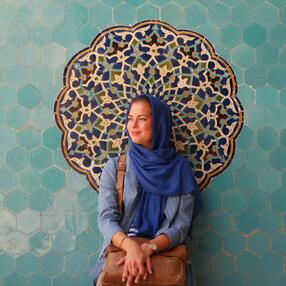
What is fascinating to me is how people try to create centers of learning and attract the best scholars from around the world, and what happens when all these minds get in one place and have access to high-level instruments and funding. The work that was done in the observatory still holds up; some of the observations they made, for example, are the best you could have gotten until the late 16th and early 17th century when new instruments like telescopes allowed greater accuracy. Scholars developed planetary models to track the trajectory of certain planets and engaged in many different disciplines, including logic, natural philosophy, and other mathematical sciences.
As the academic reputation of the observatory started to grow, more scholars came, including many from different religious traditions. It was an almost cosmopolitan environment, where academics from various backgrounds were mingling because they were all interested in sciences such as astronomy. When people think of education in the Middle East and around the world, they have this idea of a science versus religion paradigm—people are either very good scholars of natural or rational sciences, or they are very good religious scholars. But during this period, you have great scholars who bridge that divide, whose works are still studied today in traditional Islamic institutions of learning.
It is easy to typecast the Mongols as barbaric and uneducated, but the Mongol rulers of Iran commissioned the building of the observatory and paid stipends for scholars and students. While the observatory lost funding and eventually shuttered when the Mongols lost power in the region, its existence upends stereotypical understandings of them.
Content and Context
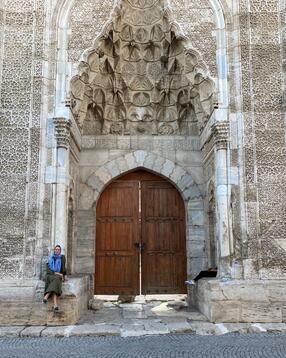
Much of my work relies on old historical records and manuscripts. The observatory was built in an earthquake-prone region, and today there is not really anything left of it or of any other buildings from the Mongol period in northwestern Iran. I do have some records of site plans and drawings of what the observatory would have looked like, but for the most part, my research involves historical sources and looking into the broader context of them. My advisor, Professor El-Rouayheb, does an excellent job of studying not just the content of a manuscript, but also the context, which I try to emulate.
Currently, I am trying to answer questions about society and scholarship, especially regarding patronage. These scholars did not work for free, so who sponsored their work? What did the patronage scene look like and how did it work? What did it mean to be a sponsored scholar? I’m looking forward to striking the balance between the contents of the treatises and understanding the context in which they were produced.
From Math to Mongols
I originally came from a math and physics academic background, but for my master’s degree, I got interested in intellectual history and then was drawn in by the Maragha observatory and the academic achievements of the scholars of the Mongol empire. All these people who worked in the observatory had a major impact on education and learning in the Middle East, which is fascinating to unravel.
What draws me to my research is the similarities between the scholarship of the past and today. Students and scholars of the Mongol empire and that period would scour the world to find the best professors to teach the subjects they were interested in, just as now an aspiring graduate student would try to find the best doctoral advisor to see their dissertation through. There were different learning avenues, either from religious institutions or private tutors or state-sponsored centers like the observatory; similar to how higher education today takes a lot of different forms, whether religious, public, or private. When I sit down and pore through the archival records of these scholars, I can see that we are sometimes not that different.
Get the Latest Updates
Join our newsletter, subscribe to colloquy podcast, connect with us, related news.

The New Amy Winehouse Biopic and Our Obsession with Tragic Geniuses
"Back to Black" is the latest in a long line of stories that captivate because they devastate writes PhD candidate Vanessa Braganza.
Old Tales, New Stories
Why do novelists seem eager to revisit familiar narratives or plots and rewrite pre-existing works, as they so often were in the 20th century? And why do they like to change or revise them?
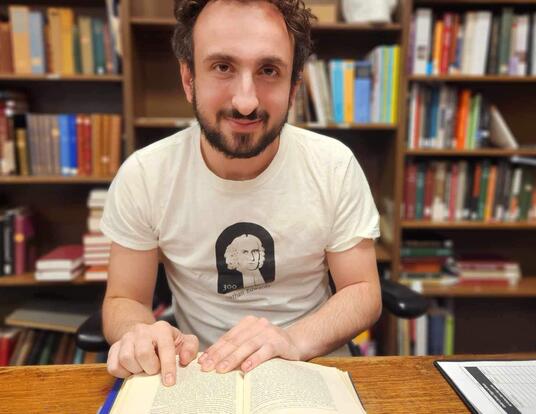
Back from Nowhere
2024 Harvard Horizons Scholar Mauro Lazarovich shines a light on the experience of the stateless—and the writers and artists who brought those “erased” by governments and bureaucracies back into view through their creative work.

Forgiving What You Can’t Forget
Wronged and can’t move on? Professors Matthew Ichihashi Potts, PhD ’13, and Tyler VanderWeele, PhD ’06, join psychologist Dr. Laura Thompson to discuss why and how to heal.


IMAGES
VIDEO
COMMENTS
Here are the requirements for earning the PhD degree in Mathematics offered by the School of Math. For requirements of other PhD programs housed within the School, please see their specific pages at Doctoral Programs.The requirements for all these programs consist of three components: coursework, examinations, and dissertation in accordance to the guidelines described in the GT Catalogue.
Yale University. New Haven, CT. #8 in Mathematics (tie) Save. 4.6. A graduate degree in mathematics can help students hone their skills in a specialty area, from algebra and number theory to ...
In outline, to earn the PhD in either Mathematics or Applied Mathematics, the candidate must meet the following requirements. During the first year of the Ph.D. program: Take at least 4 courses, 2 or more of which are graduate courses offered by the Department of Mathematics. Pass the six-hour written Preliminary Examination covering calculus ...
PhD Program. More information and a full list of requirements for the PhD program in Mathematics can be found in the University Bulletin. During their first year in the program, students typically engage in coursework and seminars which prepare them for the Qualifying Examinations . Currently, these two exams test the student's breadth of ...
Description. The graduate program in the field of mathematics at Cornell leads to the Ph.D. degree, which takes most students five to six years of graduate study to complete. One feature that makes the program at Cornell particularly attractive is the broad range of interests of the faculty. The department has outstanding groups in the areas of ...
Guide to Graduate Studies. The PhD Program. The Ph.D. program of the Harvard Department of Mathematics is designed to help motivated students develop their understanding and enjoyment of mathematics. Enjoyment and understanding of the subject, as well as enthusiasm in teaching it, are greater when one is actively thinking about mathematics in ...
Mathematics PhD Program. The Ph.D. program in the Department of Mathematics provides students with in-depth knowledge and rigorous training in all the subject areas of mathematics. A core feature is the first-year program, which helps bring students to the forefront of modern mathematics. Students work closely with faculty and each other and ...
Admissions. Financial Support. Graduate Program Administrator. Marjorie Bell (she/her) 617-496-5211. [email protected]. Science Center Room 331. 1 Oxford Street. Cambridge, MA 02138.
Our graduate program is unique from the other top mathematics institutions in the U.S. in that it emphasizes, from the start, independent research. Each year, we have extremely motivated and talented students among our new Ph.D. candidates who, we are proud to say, will become the next generation of leading researchers in their fields. While we ...
The application deadline for fall 2024 admission has passed. Applications for fall 2025 admission will open in September 2024. For information on admissions and financial support, please visit the Harvard Harvard Kenneth C. Griffin Graduate School of Arts and Sciences. Harvard Griffin GSAS is committed to ensuring that our application fee does ...
The PhD program in mathematics has an enrollment of approximately 60 students. Typically, 10-12 students enter each year. While students come from all over the world, they form an intellectually cohesive and socially supportive group. Location. New York City is America's major center of culture.
PhD-Year-2024; PhD-Year-2024. The Burau representation and Euclidean cone surfaces. Ethan Dlugie. Ian Agol. 2024. Read more about The Burau representation and Euclidean cone surfaces; The combinatorics of h*-polynomials of rational polytopes. Esme Bajo. Sylvie Corteel. ... Department of Mathematics
Currently 741 graduate programs are listed. In the wake of the pandemic, many mathematical sciences departments have made at least short-term changes in their requirements regarding the GRE for individuals applying for admission to graduate programs. The Google doc USA/Canada Math PhD Programs: GRE requirements and Qualifying Exams, curated by ...
Graduate. Graduate Students 2018-2019. The department offers programs covering a broad range of topics leading to the Doctor of Philosophy and the Doctor of Science degrees (the student chooses which to receive; they are functionally equivalent). Candidates are admitted to either the Pure or Applied Mathematics programs but are free to pursue ...
The Department of Mathematics offers Ph.D. programs in Mathematics and Applied Mathematics. The department also supports students in the Graduate Group in Logic and the Methodology of Science, an interdisciplinary doctoral program shared between the departments of Philosophy and Mathematics.At this time, we no longer offer a terminal Master's degree program.
For specific information on the Applied Mathematics PhD program, see the navigation links to the right. What follows on this page is an overview of all Ph.D. programs at the School; additional information and guidance can be found on the Graduate Policies pages.
The Applied Mathematics PhD Program has a very strong track record in research and training. Placement of PhD students has been outstanding, with recent PhD students taking tenure-track/tenured faculty jobs at institutions such as Carnegie Mellon, Columbia, Drexel, Purdue, Tsinghua, UC Santa Cruz, Utah, Washington and alike, as well as private sector jobs in leading financial and high-tech ...
The goal of our PhD program is to train graduate students to become research mathematicians. Each year, an average of five students complete their theses and go on to exciting careers in mathematics both inside and outside of academia.. Faculty research interests in the Johns Hopkins University Department of Mathematics are concentrated in several areas of pure mathematics, including analysis ...
Students who have been admitted to the PAL program, and who complete the requirements for the Ph.D. in Mathematical Sciences with a thesis in the area of logic, can choose to receive either a Ph.D. in Pure and Applied Logic or a Ph.D. in Mathematical Sciences. The choice of which degree to receive is usually based on the intended career path.
The Ph.D. in Mathematics allows study in pure mathematics, applied mathematics and statistics. The mathematics department has over 60 faculty, approximately 100 Ph.D. students, and approximately 35 Masters students. A list of the UCSD mathematics faculty and their research interests can be found at here.
The requirements for obtaining an PhD in Mathematics can be found on the associated page of the BU Bulletin. Courses: The courses mentioned on the BU Bulletin page can be chosen from the graduate courses we offer here. Half may be at the MA 500 level or above, but the rest must be at the MA 700 level or above.
The Ph.D. program also offers students the opportunity to pursue their study and research with Mathematics faculty based at NYU Shanghai. With this opportunity, students generally complete their coursework in New York City before moving full-time to Shanghai for their dissertation research. For more information, please visit the NYU Shanghai Ph ...
The typical tuition fee for a PhD in Maths in the UK is £4,407 per year for UK/EU students and £20,230 per year for international students. This, alongside the range in tuition fees you can expect, is summarised below: Situation. Typical Fee (Median) Fee Range.
Penn was ranked 8th among all US universities in a leading national study, and our mathematics graduate program was recently highest in a study of graduate programs in arts and sciences at Penn. We have a very active and involved mathematics faculty, diverse course offerings and a broad seminar schedule, with a variety of research projects and ...
UT Dallas 2024 Graduate Catalog. MATH8V02 - Individual Instruction in Mathematics. MATH 8V02 Individual Instruction in Mathematics (1-6 semester credit hours) Pass/Fail only. May be repeated for credit as topics vary.
Two powerful arguments in favor of the path of science, technology, engineering, and math are that there tend to be more STEM jobs for PhDs, and many universities' STEM departments are generous ...
Unique Program Introduces Middle School Students to Math and Coding. The University's Excellence in Math and Coding Chargers (E = MC2) was a fun after-school program for Engineering and Science University Magnet School students, offering them a sampling of math, coding, and life as a college student. May 29, 2024.
The Mongols are generally perceived as barbarians who invaded the Middle East and destroyed everything, but in history, there are many more sides to it. At their height, the Mongols controlled the largest connected land empire in history, connecting everything from today's China to Turkey. With this political control came a rise in scholarly ...